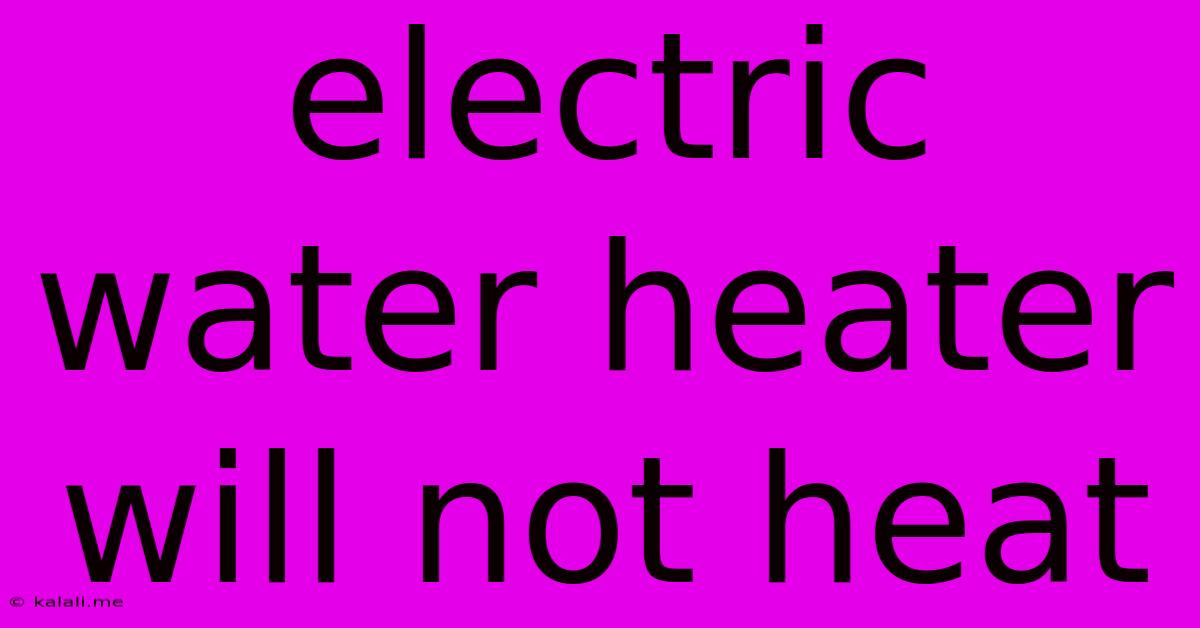Electric Water Heater Will Not Heat
Kalali
Jun 07, 2025 · 3 min read

Table of Contents
My Electric Water Heater Won't Heat: Troubleshooting and Solutions
Meta Description: Is your electric water heater refusing to heat your water? This comprehensive guide walks you through troubleshooting common problems, from simple fixes to more complex issues, helping you get hot water flowing again.
Dealing with a cold shower is never fun, and a malfunctioning electric water heater can quickly turn inconvenient into a major household headache. But before you call a pricey plumber, let's troubleshoot the problem. This guide covers common reasons why your electric water heater might be failing to heat water and offers practical solutions you can try yourself.
Check the Circuit Breaker
The most common and easiest fix is often overlooked: check your circuit breaker. Electric water heaters draw a significant amount of power, and a tripped breaker is the first thing to investigate. Locate your electrical panel, and look for a breaker labeled "water heater" or a breaker that's switched to the "off" position. Simply switch it back to the "on" position. If the breaker immediately trips again, there might be a more serious electrical issue, and you should call a qualified electrician.
Inspect the Heating Elements
Electric water heaters typically have one or two heating elements located at the bottom of the tank. These elements can fail over time due to mineral buildup, corrosion, or simply age. While you shouldn't attempt repairs yourself unless you're experienced with electrical work, visual inspection can help.
- Look for visible damage: Check for any signs of burning, corrosion, or significant mineral deposits on the elements. Heavy scaling can significantly impede heat transfer.
- Check the element connections: Ensure the wires connecting the elements to the thermostat are securely fastened. Loose connections can interrupt the electrical flow.
If you see obvious damage, replacement is necessary. However, remember that working with electrical components involves risks, and professional help is recommended.
Examine the Thermostat
The thermostat controls the temperature of your water heater. A faulty thermostat prevents the heating elements from turning on. While you can sometimes test the thermostat with a multimeter (requiring basic electrical knowledge), replacing it is often a simpler solution if you suspect a malfunction. This involves shutting off the power to the water heater and carefully disconnecting the old thermostat before installing the new one. Again, if you're not comfortable with electrical work, call a professional.
Investigate the Thermal Fuse
A thermal fuse is a safety device designed to cut the power to the heating element if the water heater gets excessively hot. If the thermal fuse blows, it needs replacement. Locate the thermal fuse—usually near the heating elements—and check for continuity using a multimeter. If it's blown (no continuity), replacement is required. As with other electrical components, caution is advised, and professional assistance is recommended for those without experience.
Assess for Leaks and Low Water Levels
A significant water leak can deplete the tank, preventing the heater from reaching the appropriate temperature for efficient heating. Check around the base of the tank for any signs of moisture or leakage. Also, verify the water level. If the water level is low, you may need to locate and repair the leak.
Consider Sediment Buildup
Over time, mineral deposits (sediment) build up at the bottom of the tank. This sediment insulates the heating elements, hindering their ability to efficiently heat the water. Sediment buildup can also lead to overheating and potential safety hazards. While flushing the tank is a possible solution, it's a messy and potentially hazardous task best left to a professional.
When to Call a Professional
While many issues can be tackled with some basic troubleshooting, some problems require the expertise of a licensed plumber or electrician. Call a professional if:
- You're uncomfortable working with electrical components.
- The circuit breaker continues to trip.
- You suspect a significant leak or low water level.
- You've tried the above steps, and the problem persists.
By following these steps and understanding the potential causes, you can effectively diagnose and address the problem of your electric water heater refusing to heat. Remember safety first, and don't hesitate to call a professional when needed.
Latest Posts
Latest Posts
-
Words That End In E Y
Jun 07, 2025
-
Not Showing Full Server Path Documentroot
Jun 07, 2025
-
Poor Wifi Reception On My Android
Jun 07, 2025
-
How To Turn Up Temp On Hot Water Heater
Jun 07, 2025
-
How To Remove Screen Door From Sliding Doors
Jun 07, 2025
Related Post
Thank you for visiting our website which covers about Electric Water Heater Will Not Heat . We hope the information provided has been useful to you. Feel free to contact us if you have any questions or need further assistance. See you next time and don't miss to bookmark.